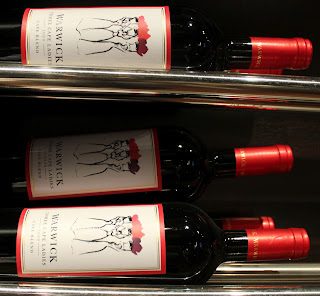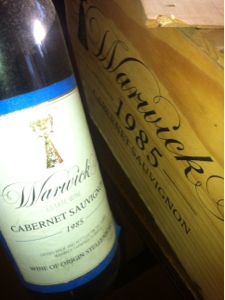Monday, June 25, 2012
Wednesday, June 20, 2012
Friday, June 15, 2012
Wednesday, June 13, 2012
Tuesday, June 12, 2012
Monday, June 11, 2012
Friday, May 18, 2012
Wednesday, May 16, 2012
Friday, May 04, 2012
WARWICK WINTER TAPAS - Available May - August 2012
Wednesday, April 11, 2012
Tuesday, April 10, 2012
Friday, April 06, 2012
Warwick in Wonderland - The best kids entertainment this rainy Easter Weekend!!
Leave it to Alice, The White Rabbit, The Mad Hatter and the Queen of Hearts to keep your kids entertained this rainy Easter Weekend. See what fun we are having...
Book now
021 8844410 or visit@warwickwine.com
Wednesday, April 04, 2012
Tuesday, April 03, 2012
Buyers and Cellars: Business Students Learn from South African Vineyards
Back in Cape Town, business students headed to
Warwick Estates in the famed Cape Winelands with Dr. Alysse Morton, this
semester’s professor of Operations Management and Global Management.
Morton, a Semester at Sea alumna who last sailed as a college student
herself, brought her two classes on a one-of-a-kind field trip to the
vineyards to better understand how a small business operates in today’s
global market.
 |
Student
Photo: Nick Hamilton, Drake
University
|
Warwick Estates, despite being a small operation in a competitive
region, has crafted a sustainable industry and carved an international
business model from production to export and every step in between.
“Their company was interesting because nothing goes to waste at all,”
Goddu continued. “They have a compost area and they pick the grapes,
ferment, and filter them on site.” Additionally, Goddu explained, the
family company has a remarkable international reach. Wine barrels are
made using wood from France and the Balkans, and Warwick’s two main
export countries are the USA and China, proving that everything is
interconnected in today’s business sphere.
The students ended their day at the vineyard gathered around a long
outdoor dining table on the sunlit brick patio. The winery served
freshly baked ciabatta loaves, oak-smoked salmon, and sun-dried tomato
pesto as the sun peaked in the afternoon sky. How’s that for a business
field trip?
Goddu, a student in both of Morton’s classes, previously visited Bamboosero Bike Company in Ghana, and will soon be touring the Coca-Cola bottling plant in Shanghai along with her business classmates.
Click here to read Dr. Alysse Morton's Bio.
Click here to learn more about Warwick Estates.
Sunday, April 01, 2012
Tuesday, March 27, 2012
Thursday, March 22, 2012
Harvest is wrapping up in South Africa
While winemakers inevitably have a multitude of different opinions on the outcome of a harvest, there are some threads that come through that when woven together correctly, can start creating a clear picture. The Vilafonte Vineyards winemaking team wrapped up harvest this week while the Warwick Wine Estate team have another couple of days to go.
In general, harvest 2012 in South Africa can, in my opinion, be considered a huge success. But why? What are the defining characteristics?
The one overwhelming common theme is that an unseasonal heat-wave descended on the Winelands in early January - a critical period for phenological ripeness. With the benefit of advanced weather forecasting being relatively common these days, the heat wave was identified about a week in advance and any and all reasonable responses to the impending temperatures were taken by those that were paying attention. Unfortunately there are very few tools to deal with excessive heat and the most powerful tool is irrigation. For those that have either decided not to invest in irrigation or who have a philosophical preference to dry-grown viticulture - 2012 will probably at least get them thinking that the judicious application of supplemental irrigation is more of a necessity than a nice-to-have. Dry-grown vineyards in the Cape lost significant tonnage and the remaining grapes would have suffered from heat stress symptoms like high pH and dropping acidity. Berry shrivel would also be an unforseen sumptom that can lead to elevated alcohol. All of these outcomes are not good.
On the other hand, this heat-wave was the only speed-bump in 2012 and for those that were able to manage it - there was no measurable negative outcome. Since mid January, the Cape has been characterized by refreshing lower than average temperatures which have provided what could best be described as an idyllic environment for the steady accumulation of sugar and the pursuit of phenological ripeness. Interestingly, in many of our vineyards we observed advanced ripeness at lower sugars which again provides an indication that 2012 could be considered a benchmark year.
On observation of the grapes at harvest, we noticed a slightly larger berry size, but excellent levels of all the goodies that lead to colour extraction, flavor compounds as well as nicely ripened tannins which create mouthfeel and texture in the wines. Without trying to 'talk it up' too much, possibly the biggest indicator of quality comes from the significantly reduced rate of berry variability which leads to concentration in the wines and is one of our most important indicators of quality - this is not a subjective measure and at the risk of being technical, we had the lowest berry variability measurement of standard deviation in my career. This basically means that at harvest, a huge proportion of berries were perfectly ripe - simultaneously.
Despite the above, I remain a cynic and I like to see out beautiful wine through fermentation before a truly great vintage can be pronounced but the signs are there at Warwick and at Vilafonte.
Stay tuned.
Mike Ratcliffe
Thursday, March 15, 2012
Wednesday, March 14, 2012
Subscribe to:
Posts (Atom)





































